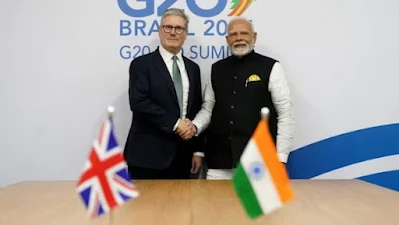The Free Trade Agreement (FTA) between India and the United Kingdom heralds a transformative chapter in bilateral relations, poised to deliver sweeping economic benefits across sectors. Representing India’s most ambitious trade pact with a developed nation in over a decade, the agreement aims to double two-way trade to $120 billion by 2030.
Expansive Market Access
A cornerstone of the agreement is the unprecedented market access it provides Indian exporters. Nearly 99% of Indian goods will enjoy duty-free entry into the UK market, covering almost the entire spectrum of bilateral trade.
This move is particularly significant for India's labour-intensive industries. Sectors such as textiles, leather, footwear, gems and jewellery, auto components, and engineering goods—currently subject to UK tariffs ranging from 4% to 16%—stand to gain immediate competitive advantages. The removal of these duties is expected to drive export growth, stimulate domestic manufacturing, and generate employment. For example, India’s leather industry alone anticipates a 5% increase in UK market share within two years, while electronics and engineering exports are projected to double by the end of the decade.
Unlocking Services Sector Potential
India's thriving services sector is also set to benefit. The agreement facilitates easier mobility for Indian professionals—chefs, yoga instructors, musicians, and other service providers—by easing entry barriers to the UK market. Business visitors, investors, and intra-corporate transferees will similarly enjoy more streamlined processes.
A standout provision is the three-year exemption from UK social security contributions for Indian professionals on temporary assignments. This measure is expected to yield annual savings of approximately ₹4,000 crore for Indian workers and their employers, enhancing the global appeal of Indian talent. Growth is particularly anticipated in IT, finance, and professional services.
Promoting Transparency and Investment
The FTA also introduces greater transparency in public procurement. UK companies will now be eligible to bid on Indian federal government contracts exceeding ₹200 crore in non-sensitive sectors, encouraging competitive standards and innovation in the Indian marketplace.
Furthermore, the deal includes progressive clauses on intellectual property, innovation, and government procurement, fostering a predictable, investor-friendly ecosystem. These elements are expected to enhance India’s profile as a credible global trade partner and an attractive destination for foreign direct investment.
Consumer Gains and Strategic Advantage
Indian consumers are also set to benefit from reduced import duties on medical devices, electronics, and select luxury goods, translating to lower retail prices and greater product accessibility.
Strategically, the agreement underscores India’s commitment to global economic integration, expanding its trade footprint beyond traditional alliances. It signals a shift towards deeper economic engagement with high-value markets and fortifies India’s positioning as a key player in global supply chains.
Conclusion
The India–UK FTA is not merely a trade agreement; it is a strategic blueprint for long-term economic cooperation. With far-reaching implications for trade, employment, investment, and consumer welfare, the accord sets the stage for a robust and mutually beneficial partnership between two of the world’s largest democracies.




.png)
The opinions posted here do not belong to 🔰www.indiansdaily.com. The author is solely responsible for the opinions.
As per the IT policy of the Central Government, insults against an individual, community, religion or country, defamatory and inflammatory remarks, obscene and vulgar language are punishable offenses. Legal action will be taken for such expressions of opinion.